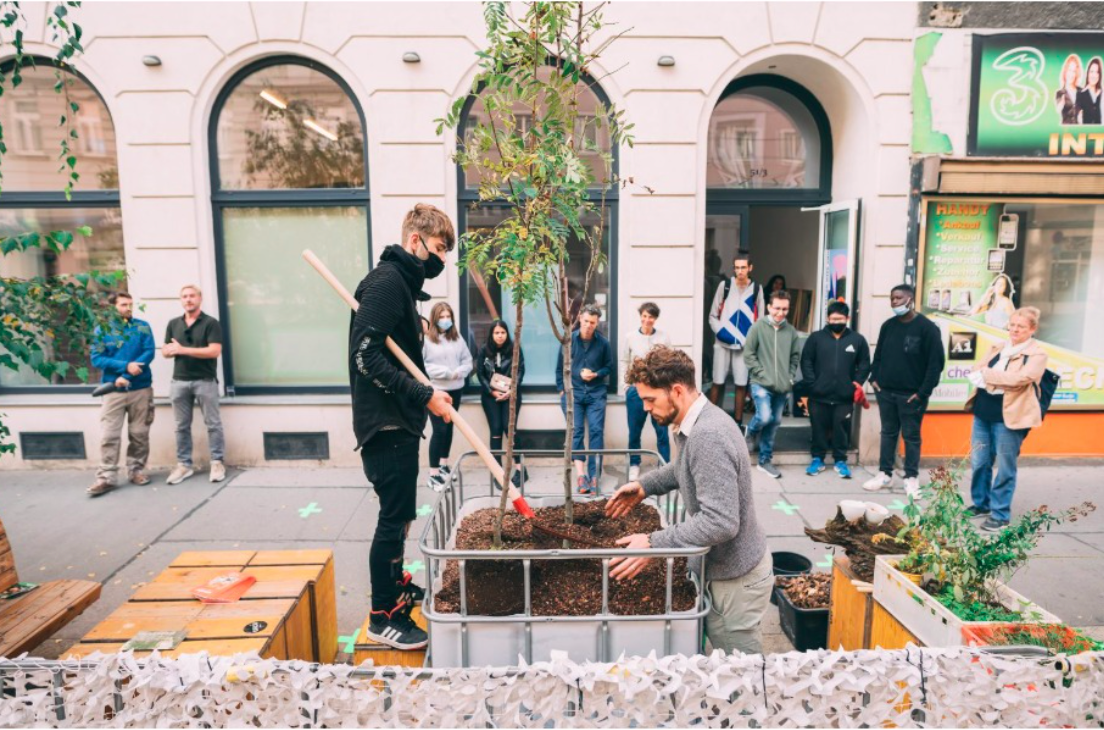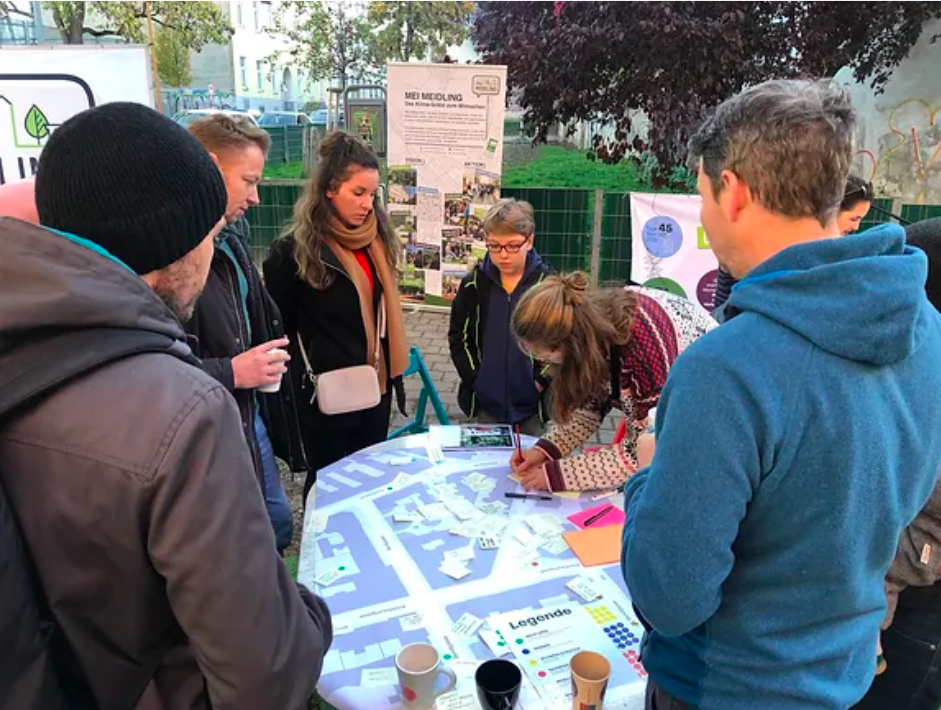We are flooded by the effects and consequnces of the global climate crisis, whether in the news, on social media, in education, or in discussions with friends and family. The conversations are filled with frustration and hopelessness of climate activists as well as scientists, leading to a sense of climate anxiety in society, effecing especially the yonger generations. However, instead of focusing on what has gone wrong, positive approaches to effective climate-related activities can offer a new-found sense of motivation and empowerment. In this article, we take a closer look at Cycle Cinema Club, Treecycle, meiMeidling and materialnomaden – four grassroots initiatives based in Vienna offering practical, local solutions for climate-change mitigation, inviting citizens to join in.
These four inspiring initiatives in Vienna have enabled people to get active, come together to share experiences, hopes and fears and take action by participating in local solutions they co-create. They have two distinct impacts: they help fight climate anxiety and result in climate change mitigation as locals get involved in their communities and contribute to sustainable actions. On the other hand, these initiatives showcase how bottom-up activities can make a difference without relying on directives or solutions implemented solely by decision-makers.
Cycle Cinema Club
Established in 2012, Cycle Cinema Club is a Vienna-based organisation that promotes culture, sports, and environmental awareness through social engagement. Cycle Cinema Club organises movie screenings on environmental topics, such as mobility, urbanism, climate protection and uses an innovative approach to create the needed energy for the screenings: participants must continuously cycle on three bikes and create the electricity needed for the machines and projectors needed for the screening. If no one cycles, the movie screening will stop.

The organisation was established by a group of cycling enthusiasts with the aim to promote the benefits of cycling and self-sufficient energy production in an innovative way. A central goal of the Cycle Cinema Club is to engage people in actualizing the event through shared responsibility, and thus show how important the role of cooperation is.
Those attending must bring their own seating and movie treats. The organisation simply supplies the cycling machines and screening gear, as well as curates the movies. To make it accessible for all, the events are completely free. The screenings take place in multiple locations, such as in parks, squares, and other public places. As the activities take place outside, Cycle Cinema Club operates in summer months mostly, and at least once a month. Not only does the organisation host events in Vienna, but also outside the capital in Austria and beyond.
In September 2022 a popup cycle-cinema-festival was organised in Vienna’s first Supergrätzl in Favoriten, the city’s 10th district. Have a look here.
Treecycle
Treecycle empowers people to create climate-friendly solutions in the city to tacke urban heat islands, a result of excess built environment and lack of green spaces. These heat islands make our cities unbearable in summers and most solutions to tackle it need vegetation with heavy maintenance, which makes them vulnerable. Yet urban greenery is very effective to create good microclimates in our cities. By using trees as the starting point, Treecycle aims to show how public spaces can be more socially and ecologically sustainable.
Treecycle was formed as an organisation by experts in architecture, ecology, and sustainable design. Together, they produced a tangible model to tackle the issue of urban heat islands. The Treecycle mechanism collects rainwater, stores it in recycled industrial tanks, from where it slowly evaporates via the tree, creating a cooler microclimate, while providing shade and seating for passersby. The result? A self-regulating urban ecosystem. When set up in a public space, it provides everyone with access to a shared space where it is possible to relax and escape the heat and cool off, while reconnecting with nature.

Treecycle has their office in Taborstraße, and workshop in Zukunftshof. The organisation set up the first prototype of its urban ecosystem in Columbusplatz, in the Favoriten district of Vienna. The message that the members of Treecycle want to convey extends beyond the physical ecosystem: not only do they advocate for finding new solutions for climate-related activities in local neighbourhoods by using existing materials, but they also promote social sustainability through working with disadvantaged young adults. This leads to empowerment in becoming an agent of change in one’s own living environment.
If you would like to know more about Treecycle, take a look at this short film produced by wonderland, where Treecycle describes the establishment of the organisation and their work.
meiMeidling
Located in the southwest part of the city, Meidling is the home to approximately 94,000 inhabitants. While there are many public spaces such as parks and the local market Meidlinger Markt, these spaces are deemed cold and uninviting, and therefore are underutilised by the locals.
During the beginning of the global Covid crisis, a group of activists came together with the goal to enhance the quality of the public spaces in Meidling and formed a citizen initiative meiMeidling. It is an association, operating via monthly meetings, with the ultimate goal of transforming Meidling into a climate-friendly, barrier-free, and peaceful neighbourhood by 2025, transforming functional spaces to living spaces.

The meiMeidling initiative organises different monthly activities around environmental and climate -related topics.The most prominent yearly activity of meiMeidling is the Klima-Grätzl fest, which has now been held for three consecutive years. Open to the public and with no ticket needed, the festival brings together different initiatives in the field of sustainability and community engagement, such as sustainable food producers, and offers discussions on environmental actions. The festival further enables locals to give feedback on the neighbourhood, and what kinds of changes they would like to see.
During the Klima-Grätzl fest, a temporary Superblock, called the Supergrätzl, was implemented in the surrounding spaces of MeidlingMarkt. The Superblock is an urban planning method that was created and implemented by the Urban Ecology Office Barcelona, with the idea to create traffic-calmed spaces in the city in order to promote access to public space and pedestrian-friendly zones.
They organise activities such as neighbourhood barbecues to bring together the local community, with products sourced from the local market, Meidlinger Markt, and workshops for children to learn about biodiversity in urban green areas.
meiMediling already can claim a major success: They have been advocating for the transformation of Reschgasse, from a narrow, residential street used mainly for car-parking into a traffic-free street with vegetation and seating, converting it into a public space, safe for children to play in. The planning phase incorporated feedback from locals and through meetings with city officials the transformation of Reschgasse is now approved by the municipality and will take place in 2023. Read more about it here
materialnomaden
The focus of materialnomaden is on circular design implementation in architecture through sourcing construction site waste. materialnomaden works through the process of recycling, reusing and redesigning. The group is continuously questioning: How to optimize material cycles and how does re-use contribute to environmental protection? What can we do with already available material? How do we integrate re-use into the construction sector?

Located in the 10th district of Vienna in the Kreta neighbourhood, materialnomaden brings together experts in architecture, urban planning, construction, art and design. The organisation gathers materials from construction sites, where buildings are to be demolished, restore the materials, and put them in their catalogue and provide information on the origins of material. These materials are then utilised and promoted at popup events, where they showcase the prototypes of innovative and unique designs. These events often lead to workshops and different events, such as collaborations with university students. Thus, the popup events act as incubators for future projects.
From cupboards to roofs and facades made of aluminium, by using less material for more results, the benefits of circular design are clear. The organisation has relations with public bodies in the field of housing and construction with the aim to establish governance instruments regarding the re-use of existing materials. materialnomaden not only advocates for the benefits, but also for the responsibility in using materials that have already been sourced.
One of the cornerstones within the work of materialnomaden is the acknowledgement that there is still much to learn and invent. It all starts from walking around in spaces with constructions and thinking about the possible use-value of the existing materials. Favouring local production has reached interest in food and retail, so why not emphasise this also in construction and architecture?
If you would like to know more of the work of materialnomaden and circular economy in design processes, take a look at this webinar organised by wonderland, where Peter Kneidinger from materialnomaden discusses the establishment of the organisation, and how they work with sustainable design through upcycling and recycling materials.
Small-scale actions to enhance the quality of urban space
These are only four of the many examples, where citizen-led initiatives come up with climate-friendly solutions for to create sustainable models for cities and making our living spaces healthier and more liveable. These initiatives not only benefit the environment but create empowering social connections through participation, green and attractive shared spaces as well as collaboration.
By Ulrika Stevens and Sophie Bod

